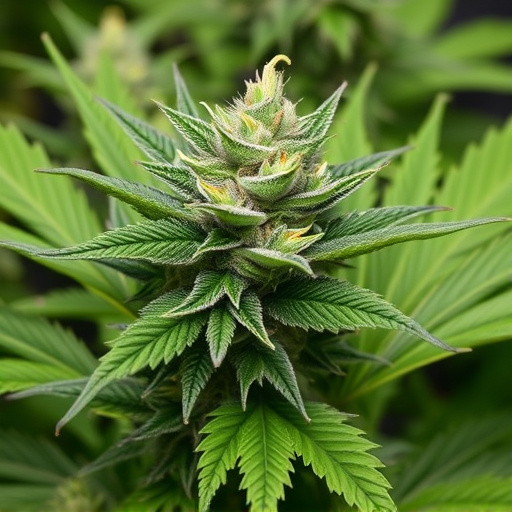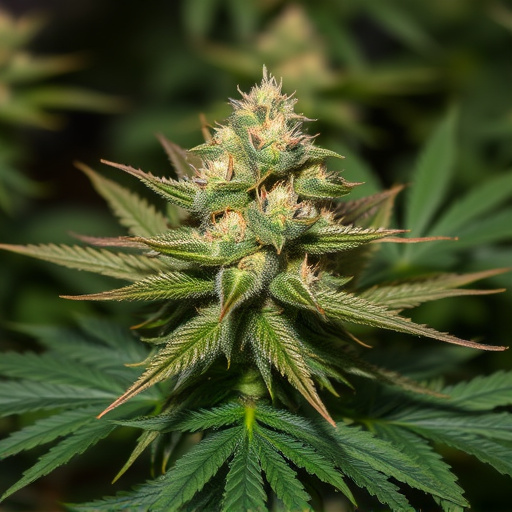Potent cannabis strains, enriched with over 100 cannabinoids like THC and CBD, along with terpenes, offer therapeutic benefits for chronic pain, anxiety, epilepsy, and inflammation. These compounds interact with the human endocannabinoid system, revolutionizing medical treatments and enabling precision medicine. Future research aims to develop personalized therapies, improve cultivation techniques, and foster interdisciplinary collaboration to fully unlock the medicinal potential of potent cannabis strains.
“Unveiling the therapeutic potential of cannabis flower is a growing area of interest in modern medicine. With its diverse chemical composition, particularly notable are the potent cannabis strains that offer promising treatments for various conditions. This article explores the medical uses of cannabis flower, delving into the science behind its effectiveness. From understanding the plant’s chemistry to investigating specific potent cannabis strains and their therapeutic benefits, we’ll uncover the exciting scientific insights shaping the future of cannabis medicine.”
- Understanding the Medical Potential of Cannabis Flower
- Exploring Potent Cannabis Strains for Therapeutic Use
- Scientific Insights and Future Directions in Cannabis Medicine
Understanding the Medical Potential of Cannabis Flower

Cannabis flower, long a subject of controversy, is increasingly recognized for its significant medical potential. The plant contains over 100 cannabinoids, including tetrahydrocannabinol (THC) and cannabidiol (CBD), each with unique therapeutic properties. THC, known for its psychoactive effects, has shown promise in alleviating symptoms associated with conditions like chronic pain, nausea, and insomnia. On the other hand, CBD, non-intoxicating, has gained attention for its anti-inflammatory, anticonvulsant, and anxiolytic effects, making it a potential treatment for epilepsy, anxiety disorders, and inflammation-related diseases.
Beyond these well-documented cannabinoids, lesser-known compounds in potent cannabis strains contribute to their medical value. Terpenes, aromatic compounds responsible for the distinct smells of different cannabis varieties, offer additional therapeutic benefits. For instance, myrcene, found in many indica strains, exhibits sedative properties and may help with insomnia. Pinene, prevalent in sativa strains, possesses anti-inflammatory and antimicrobial effects. Understanding these complex interactions between cannabinoids, terpenes, and other compounds is crucial for harnessing the full medical potential of cannabis flower.
Exploring Potent Cannabis Strains for Therapeutic Use

In the quest for therapeutic solutions, exploring potent cannabis strains has emerged as a promising avenue in modern medicine. These carefully cultivated varieties offer unique chemical compositions, with high concentrations of cannabinoids like THC and CBD, which have shown significant potential in treating various medical conditions. Scientists and researchers are now delving into the complex world of these powerful plants to unlock their therapeutic benefits.
By studying and understanding the distinct characteristics of different potent cannabis strains, healthcare professionals can prescribe specific varieties tailored to individual patient needs. This precision approach allows for more effective treatment options, as certain strains have proven successful in alleviating symptoms associated with conditions such as chronic pain, anxiety, epilepsy, and inflammation. The ongoing exploration and research into these powerful cannabis strains are revolutionizing medical practices, offering hope for improved quality of life and enhanced well-being for many.
Scientific Insights and Future Directions in Cannabis Medicine

The scientific exploration of cannabis has revealed remarkable potential in medicine, opening doors for future treatments and therapies. Research into various potent cannabis strains has unveiled a wealth of chemical compounds, including cannabinoids like THC and CBD, which interact with the human endocannabinoid system. This interaction offers promising avenues for managing diverse medical conditions, from chronic pain and inflammation to anxiety and neurodegenerative disorders.
As our understanding deepens, future directions in cannabis medicine look promising, with potential developments including tailored treatments based on individual cannabinoid profiles. Advanced cultivation techniques allow for the creation of more potent cannabis strains with specific therapeutic benefits, catering to precise patient needs. Additionally, interdisciplinary collaborations between botanists, pharmacologists, and medical professionals are pivotal in unlocking the full potential of cannabis as a legitimate medicinal resource, ensuring safe and effective applications.
The medical potential of cannabis flower, particularly its potent strains, has emerged as a promising area of research. With scientific insights gaining momentum, we are witnessing revolutionary advancements in cannabis medicine. Understanding the unique compounds within these strains offers hope for various therapeutic applications, providing an alternative approach to traditional treatments. As knowledge expands, continued exploration and clinical studies will shape the future of cannabis-based therapies, potentially transforming healthcare and improving lives.














